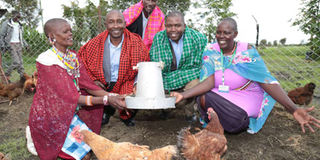Poultry project puts money in the hands of pastoralist women

Tony Gathungu, Monsanto’s East, Central and Southern Africa Lead, Jimmy Kiberu the communications director and Peter Muthee, the managing director of Latia Resource Centre, pose with women beneficiaries of the Poultry Project for Income Generation launched by Monsanto Fund. PHOTO | BRIAN OKINDA | NMG
What you need to know:
- Eggs have become her biggest source of income in the agribusiness, as she sells each at Sh15.
- Maasai pastoralists in Kajiado are grappling with the consequences of droughts, rising temperatures, erratic rainfall and other effects of global climate change.
- Tony Gathungu, Monsanto’s East, Central and Southern Africa Lead, says the project was started as an experiment in 2015 to assess what Maasai women need to come out of poverty.
- The recipients will be purposed to grow their flock to 70-100 birds in about six months after which they will give back to the project five birds.
Until August last year, Joyce Molomet’s only source of income was a small kiosk outside her house in which she sold basic household items.
A friend introduced the mother of five from Enkaroni location in Kajiado County to a poultry programme running at Latia Agribusiness Resource Centre.
“I started with 10 improved Kienyeji chicken that Latia gave me and they also provided inputs such as vaccines and feeds.
I was also trained on the best poultry-rearing practices and management,” she says. Seven months later, Joyce has 37 chickens, after selling some and returning 10 to Latia to cater for those she was initially given so that someone else can benefit.
Eggs have become her biggest source of income in the agribusiness, as she sells each at Sh15. Supported by the Monsanto Fund from Monsanto Company and Faraja Trust, and run by Latia, the Poultry Project for Income Generation seeks to empower women in the pastoralist community.
“Maasai pastoralists in Kajiado are grappling with the consequences of droughts, rising temperatures, erratic rainfall and other effects of global climate change. Normally, women and children bear the brunt,” says Peter Muthee, the managing director of Latia Resource Centre.
Tony Gathungu, Monsanto’s East, Central and Southern Africa Lead, says the project was started as an experiment in 2015 to assess what Maasai women need to come out of poverty.
The success of the project saw the company expand it to a tune of Sh7.6 million, this time targeting up to 2,500 women smallholder farmers in the region.
In the new programme, women will be given five chickens, start-up capital, requisite vaccines and feeds and access to loan services, according to Muthee, after which they be trained on managing the birds and marketing.
The recipients will be purposed to grow their flock to 70-100 birds in about six months after which they will give back to the project five birds.
Agritech, the establishment tasked with the purchasing of the eggs and chicken from the farmers, will register their details to enable the firm to know the feeds and vaccines to give to the farmers.
Other organisations such as Choice Microfinance and Wacho Women Group will provide credit, financing and saving services.





